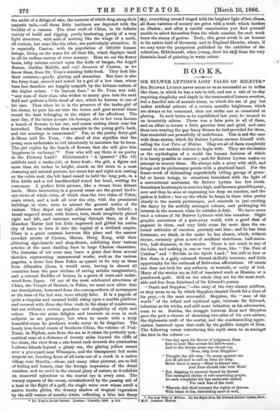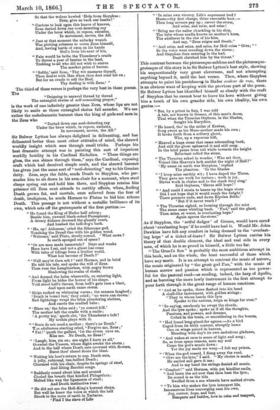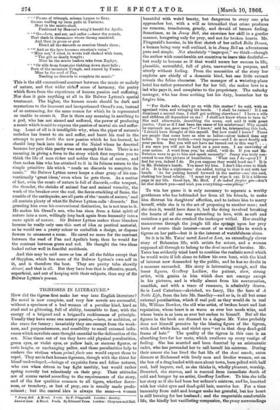BOOKS.
SIR BULWER LY'TTON'S LOST TALES OF MILETUS.,
SIR BULWER LYTrox never seems to us so successful as in trifles like these, in which he has a tale to tell, and not a tale of to-day requiring simplicity and depth in the treatment of human emotion, but a fanciful tale of ancient times, in which the use of gay but rather artificial colours of a certain metallic brightness, which are always at his command, does not strike one as unnatural or glaring. In such lyrics as he republished last year, he seemed to us invariably odious. There was a false pote in all of them,
and an effort to invent a little genuine love and grief, and coax them into wearing the gay fancy dresses he had provided for them, that reminded one powerfully of melodrama. This is not the case with these stories, which Sir Bulwer Lytton amuses himself with calling the Lost Tales of Miletus. They are all of them completely
unreal to our modern notions to begin with. They are the stories or the mythologies of a world the human features of which it is barely possible to recover ; and Sir Bulwer Lytton makes no
attempt to recover them. He always tells, a story with skill, and brings out its picturesque points with a practised hand. For the fresco-work of delineating superficially telling groups of grace-
ful or heroic beings, in situations burnished with the light of a conventional sentiment, Sir Bulwer: Lytton has few rivals.
Sometimes he attempts to soar too high, and becomes grandiloquent, now and then he aims at expressing too deep an emotion, and the pathos is hollow ; but on the whole he keeps in these tales pretty closely to the merely picturesque, and succeeds in just exciting the fancy by his artfully arranged colours, and prolonging his interest to the moment when he satisfies it duly. We have never read a volume of Sir Bulwer Lytton's with less vexation. Slight graphic narratives of a past-away world, with a good deal of pageant in them, and very little room for more tlan the ex, ternal attitudes of emotion, precisely suit him ; and he has been fortunate, we think, in the metre he has chosen, which, without rhyme, certainly gives a sort of artificial stateliness, half-narra- tive, half-dramatic, to the stories. There is not much in any of the tales, and nothing in one or two of them, like " The Fate of Calchas " and " Bridals in the Spirit Land ;" but still in four or five there is a gaily coloured thread skilfully inwoven, and little opportunity for the outbreak of Bulwerian affectations. Of course one does not look for any softness, or warmth, or unity of tint.
Many of the stories are as full of tesselated work as Mosaics, or a patchwork quilt. Still on the whole they are far the most read- able and free from falsehood of Sir Edward's poems.
"Death and Sisyphus,"—the story of the very clumsy artifices, as they seem to us, by which Sisyphus cheated Death for a time of his prey,—is the most successful. Sisyphus, the " man of the world " of the infant and mythical ages, interests Sir Edward, infantine as his tricks, and still more infantine as his adversaries, seem to us. Besides, the struggle between Zeus and Sisyphus gave the poet a chance of sketching two sides of his own nature, the diplomatic craft of the mortal, and the condescending appre- ciation bestowed upon that craft by the godlike insight of Zeus. The following verses introducing this myth seem to us amongst the best in the volume :-
" One day upon his throne of judgment, Zeus Sate to hear Man accuse his fellow-man ; And to the throne arose one choral cry,
• Zeus, help from Sisyphus !
" Thought the All-wise, So many against one Are ill advised to call on Zeus for help: Brute force is many—Mind is always one : And Zeus should side with Mind.'
" But, deigning to unravel thread by thread The entangled skeins of sell-concealing prayer,
At each complaint his lips ambrosial smiled, For each was of the craft
" Wherein this thief usurped the rights of thieves. With brain of fox, defrauding maw of wolf,
• The Loa Tales of lftldue. By the Right Hon. Sir Edward Ruiner Lytton, Bat, M.P. London: Murray.
So that the wolves howled 'Help from Sisyphus : • Zeno, give us back our lambs ! '
" Curious to look upon this knave of knaves, Zeus darted down one soul-detecting ray Under the brow which, in repose, sustains, In movement, moves, the All.
" Just at that moment the unlucky wretch Was plotting schemes to cozen Zeus himself, And, having herds of oxen on his hands Stern from his next of kin, " Fain would he bribe the Thunderer's oracle To threat a year of famine to the land, Trebling to all who did not wish to starve The market price of beeves.
" Softly,' said Zeus, Thy wit ensnares thyself, Thou deal'st with Man when thou dost steal his ox ; But for an oracle to sell the Beef, Thy dealing is with Zeus.' "
The third of these verses is perhaps the very best in these poems. The
"Deigning to unravel thread by thread The entangled skeins of self-concealing prayer,"
is the work of one infinitely greater than Zeus, whose lips are not likely to smile as those entangled skeins fall asunder. We see rather the melodramatic baronet than the king of gods and men in
the Zeus who
"Darted down one soul-detectingsay Under the brow which, in repose, sustains, In movement, moves, the All."
Sir Bulwer Lytton has always delighted in delineating, and has delineated better than most other attitudes of mind, the shrewd worldly insight which sees through small tricks. Perhaps his best dramatic attempt was in painting this sort of imperious worldly lucidity in his Cardinal Richelieu. " These things are glass, the sun shines through them," says the Cardinal, exposing craft which had deceived simple souls, and the shrewd baronet has given just the same sort of "soul-detecting" ray to his Grecian deity. Zeus, says the fable, sends Death to Sisyphus, who per- suades him to sit down in his arm-chair for a moment, when steel clasps spring out and hold him there, and Sisyphus retains him prisoner till Zeus next attends to earthly affairs, when, finding Death grown fat, and mortals, once relieved from the fear of death, irreligious, he sends Hermes to Plutus to bid him release Death. This passage is not without a metallic brilliance of its own, which sets off the grotesquerie of the first portion: " He found the King of Hades half asleep ;
Beside him, yawned black-robed Persephone ; A dreary dulness drowsed the ghastly court, And hushed the hell-dog's bark.
" Ho, up! Aidoneus,' cried the lithesome god, Touching the Dread One with his golden wand.
Welcome,' said Pluto, slowly roused. What news ?
Is earth sponged out of space?
"'Or are men made immortals? Days and weeks Here have I sat, and not a ghost has come With tales of tidings from a livelier world.
What has become of Death ?'
" Well may'st thou ask ? ' said Hermes, and in brief He told his tale, and spoke the will oiZeus.
Then rose the Laughterless, with angry frown Shadowing the realm of shade, "And donned the helm wherewith, on entering light, From light he hides the horror of his shape.
Void stood hell's throne, from hell's gate rose a blast, And upon earth came storm.
Ships rocked on whitening waves ; the seamen laughed ; 'Death is bound fast,' they cried; ' no wave can drown.'
Red lightnings wrapt the felon plundering shrines, And smote the cradled babe : "'Blaze on,' the felon said • ye cannot kill.'
The mother left the cradle with a smile; 4 A pretty toy,' quoth she, the Thunderer s bolt !
My urchin plays with it.
" ' Brats do not need a mother ; there's no Death.'
Tae adulteress starting cried, Forgive me, Zeus ;' Tut!' quoth the gallant, let the storm rave on.
Kiss me. No Death, no Zeus!'
"'Laugh, kiss, sin on; ere night I have ye all,' Growled the Unseen, whose flight awoke the storm ;
And in the hall where Death sate crowned with flowers,
Burst thro' closed doors the blast.
" Waiting his host's return to sup, Death sate, A jolly, rubicund, tun-bellied Death; Charmed with his chair, despite its springs of steel, And lilting Bacehic songs.
" Suddenly round about him and around Circled the breath that kindled Phlegethon; Melted like wax the ligaments of steel; And Death instinctive rose : " He did not see the Hell-King's horrent shape, But well he knew the voice at which the hall Shook to the roots of earth in Tartarus.
Find I the slate of Life
" In mine own viceroy, Life's supremest lord ? Haste—thy first charge, thine execrable host :- Then long arrears pay up ; career the storm, And seize, and seize, and seize !
"'Bring me the sailor chuckling in his ship, The babe whose cradle knows no mother's knee, The adulterer in the riot of his kiss, And say, "Zeus reigns and Death."
"'And seize, and seize, and seize, for Hell cries "Give; " So the voice went receding down the storm ; And Sisyphus then entering in the hall, Death clutched him by the throat."
This contrast between the picturesque-sublime and the picturesque- grotesque of this story is in Sir Bulwer Lytton's best style, showing his unquestionably very great cleverness, and not attempting anything beyond it, until the last verses. Then, where Sisyphus. attempts to paint his punishmeu in Hades couleur de rose, there is an obvious want of keeping with the previous part of the poem. Sir Bulwer Lytton has identified himself so closely with the craft. of Sisyphus that he cannot bear to leave his hero without giving him a touch of his own grander side, his own ideality, his own genius :-
"But, by a priest in Sala, I was told A tale, not known in Greece, of this man's doom, That when the Thracian Orphena, in the Shades, Sought his Eurydice, " He heard, tho' in the midst of Erebus, Song sweet as his Muse-mother made his own ; It broke forth from a solitary ghost, Who, up a vaporous hill, " Heaved a huge stone that came rebounding back, And still the ghost- upheaved it and still sang.
In the brief pause from toil while towards the height Reluctant rolled the stone, " The Thracian asked in wonder, ' Who art thou, Voiced like Heaven's lark amidst the night of Hell?'
'My name on earth was Sisyphus, ' replied The phantom. 'In the Shades
"'I keep mine earthly wit ; I have duped the Three.
They gave me work for torture ; work is joy. • Slaves work in chains and to the clank they sing.' Said Orpheus, Slaves still hope! '
" ' And could I strain to heave up the huge stone Did I not hope that it would reach the height ? There penance ends, and dawn Elysian fields.' But if it never reach ? '
" The Thracian sighed, as looming through the mist The stone came whirling back. Fool,' said tho ghost; Then mine, at worst, is everlasting hope.'
Again uprose the stone."
As if Sisyphus, the artful dodger' of Greece, would have cared about ' everlasting hope' if he could have had it. Would Mr. John, Dawkins have felt any comfort in being doomed to the everlast- ing hope' of a ticket-of-leave? Sir Bulwer Lytton carries his theory of that double element, the ideal and real aido in every man, of which he is so proud in himself, a little too far.
"The Oread's Son" is probably the most ambitious attempt in this book, and on the whole, the least successful of those which have any merit. It is an attempt to contrast the music of nature, the music originated by " the great god Pan," with the music of human sorrow and passion which is represented as too power- ful for the pastoral reed—as needing, indeed, the harp of Apollo and as bursting the more lowly instrument in the first attempt to pour forth through it the great range of human emotions.
" And as he spoke, there flashed into his hand
A shell-like instrument, with golden strings : "They in whose hands this lyre Speaks to the nations, reign as kings for ever."
" So saying, carelessly he swept the chords, And the lyre spoke ; spoke as if all the thoughts, Passions, and powers, and dreams,
Coiled in the brain, or smouldering in the bosomy
" Had found long-pined-for egress.—As a bird Caged from its birth content, abruptly hears One on wings poised in heaven, Blending with day's its own melodious gladness, " And wakes at once to sense of light and song ; So, as from space remote, unto my soul Came the god's music down : Yet the joy made me weep—I felt my prison.
" When the god ceased, I flung away the reed.
" Give me the lyre," I said. " My choice is made." He smiled and gave it me;
And to my hand the strings denied all music.
" Comfort!" said Hermes, with yet kindlier smile, " And learn the art now that thou haat the lyre ; Its sound is as the tide Swelled from a sea wherein have melted rivers.
" "To him who makes the lyre interpret life, Innumerous lives converging sum his own, Jon sorrow' hope, and fear, Banquets and battles, love in calm and tempest, " " Paeans of triumph, solemn hymns to Zeus, Groans wailing np from gulfs in Tartarus, Moot in the music-shell,
Fashioned by Heaven's wing'd herald for Apollo.
" " Go—love, and err, and suffer ;—hear the sounds, That clash in diasonance where throng mankind, And then in grove or grot Blend all the discords as creation blends them ; " '" And so the lyre becomes creation's voice."
"Mine not," I cried, in words half choked with tears, " The gift so dearly bought ;
Mine be the music leaflets take from Zephyr,
" "Or rills from fountains tinkling down their falls ;
Born of the mountain Nymph, and reared by Fauns ; Mine be the reed of Pan,
Needing no discords to complete its music."
This is the old conventional contrast between the music or melody of nature, and that wider richeP sense of harmony, the poetry which flows from the experience of human passion and suffering. Nor does it gain anything at all in Sir Bulwer Lytton's special treatment. The higher, the human music should be dark and mysterious to the innocent and inexperienced Greed's son, instead of so entrancing, for the same reason for which he is represented as unable to create it. Nor is there any meaning in ascribing to a god, who has not sinned and suffered, the power of producing a music which is said to express the passion of mortal sin and suffer- ing. Least of all is it intelligible why, when the piper of nature's melodies has learnt to sin and suffer, and burst his reed in the attempt to pour forth the new passion which he has learned, he should leap back into the arms of the Naiad whom he deserted because her pale thin parity was not enough for him. There is no meaning in giving a form to the story which first requires you to -think the life of man richer and nobler than that of nature, and then makes him who has attained to it in its fulness return to the simple primitive life which " needs no discords to complete its music." Sir Bulwer Lytton never keeps a clear grasp of his con- ventionally ' great ideas,' even when he gets them. As a matter of fact, even the music of nature is full of discords,—the tempest, the thunder, the shrieks of animal fear and animal voracity, the wash of the breaker over the reef, the fierce crackling of flame, the rumble of the earthquake, are all parts of the' music of nature,' and all contain plenty of what Sir Bulwer Lytton calls discords.' But granting him even his conventional distinction, he is not true to it. He makes his Oread's son, who has risen from a faint spirit of nature into a man, willingly leap back again from humanity into a mere spirit of nature. Sir Bulwer Lytton makes these blunders because he really only uses this sort of idea as poetical material, as he would use a pretty colour to embellish a design, or dispose flowers to ornament a room. He cared no more for the contrast between the reed of Pan and Apollo's harp, than he would for the contrast between green and red. He thought the two ideas looked rather well in fanciful antithesis.
And this may be said more or less of all the fables except that of Sisyphus, which has more of Sir Bulwer Lytton's own self in it, and is therefore the best. They are pretty tales showily &core, and that is all. But they have less that is offensive, smart, euperficial, and out of keeping with their subjects, than any of Sir Bulwer Lytton's poems.
































 Previous page
Previous page